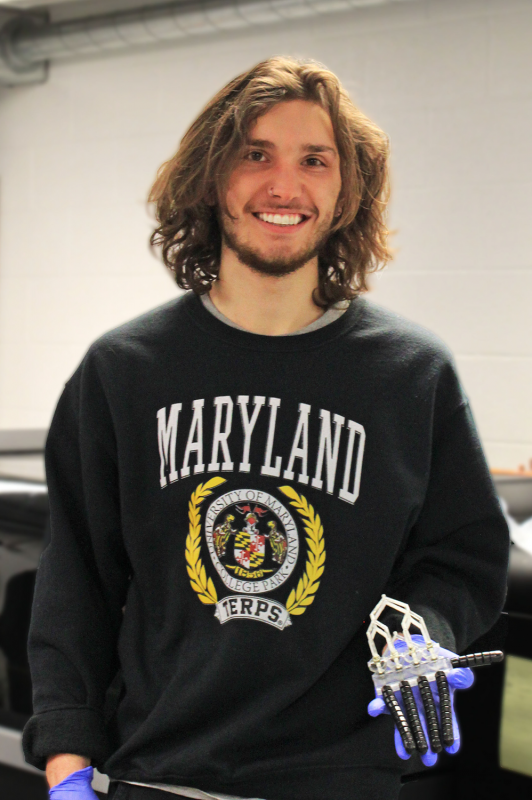
The best part of working in my position is that it gives me a holistic perspective of the academic publication process.
Joshua Hubbard, a third-year chemical engineering major and Baltimore native, has been making his mark at the University of Maryland through his work in the engineering labs and his dedication to research.
Hubbard is in the Quality Enhancement Systems and Teams (QUEST) honors program, a multidisciplinary, hands-on program for undergraduates that focuses on quality management, process improvement, and system design through teamwork and co-curricular programming. He was also an active member of UMD's Engineers Without Borders (EWB) during his freshman year, running calculations for a water distribution project in Ghana and advocating for EWB presence in India.
But, Hubbard says, "The stuff I’m most proud of is the research I've done. Being able to put together a publication and substantively contribute to a field of research has been a valuable experience for me."
Joining Assistant Professor of Mechanical Engineering Ryan Sochol's lab as a freshman in Fall 2017, Hubbard has gained hands-on, academic experience that many undergraduates have yet to access.
"The best part of working in my position is that it gives me a holistic perspective of the academic publication process," Hubbard says. "There are a lot of nuances to the academic research process that many undergraduates are unfamiliar with. As a result, a lot of talented people who would be successful in graduate school can be intimidated. I've been lucky enough to have an exceptional mentor, Dr. Ryan Sochol, who is willing to familiarize me with every step."
One of his first projects focused on using microfluidic technologies to design more efficient diagnostic equipment, making them phone-sized, portable, and capable of analyzing samples on the spot rather than requiring an entire lab. To do so, Hubbard and the research team he was a part of applied microfluidic circuitry to a finger-pumping mechanism, allowing minimal effort to power the device. This technology could function in developing countries with extremely limited access to electricity and medical services.
Hubbard took on a leadership role for this project, guiding the design process, fabrication, and testing, which would later allow him to take on similar leadership roles on larger projects. One such project he works on is a soft robotic hand, which he believes to have the most potential for real-world impact out of all his research projects.
This particular project explores the potential of 3-D printing a soft robotic hand with fully integrated microfluidic circuitry that enables each finger to be independently actuated using only a single control input, increasing the practicality and versatility of such technologies. Historically, the field of robotics has primarily relied on metal-based systems controlled by electronics; however, emerging applications that involve human–robot interactions have led to increasing interest in soft robotic systems that would allow a manufactured hand to be human-like.
Upon his graduation from UMD, Hubbard knows he will immediately pursue graduate school, where he plans to continue his research on the intersection of advanced manufacturing, chemistical engineering, and biology.
Despite his eagerness for graduate life, Hubbard continues to enjoy his undergraduate experience as a Terp. When he's not doing research in the lab, he can be found working for the Adventure Program at the climbing wall in Eppley Recreation Center, grateful to have a community to connect with outside of academics.
But within the academic experience, the Clark School community is one of the reasons why Hubbard has enjoyed his time as an engineering student.
"The one thing that I consistently value and appreciate about Maryland and working in the lab here is the diversity. In my experience, the best way I've found to overcome tensions with regard to a lot of the issues we face today is by interacting in an academic environment with people," he says.
Hubbard notes that collaborating on research does not have cultural boundaries; people from all walks of life come to problem solve together, and diversity can only benefit the experience.
"You can't underestimate the value of collaborating with people of different nationalities, races, or genders," he says. "I think the best way to overcome any fear or bias is to work in an academic setting with people that are different from you."
Top